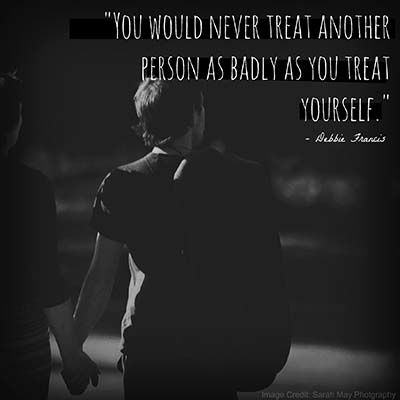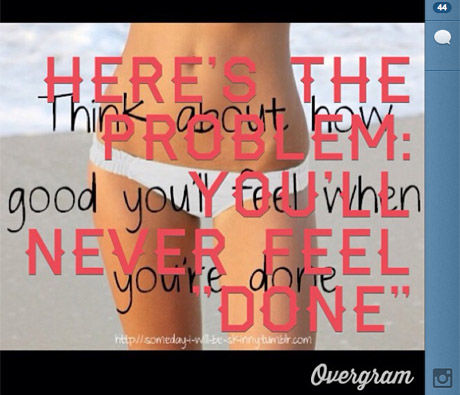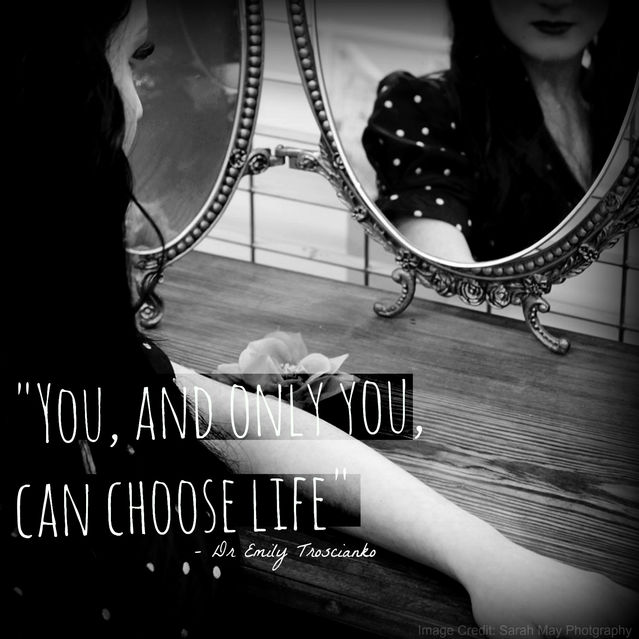Eating Disorders
Eating Disorders in the Online World
The dangerous trend of ‘thinspirational’ web content.
Posted March 25, 2014
The internet can be a place where people with eating disorders seek and find reliable information about what they’re doing to their bodies, about how their experiences are typical of the disorder they suffer from, about what recovery entails and how to embark on it; it can be a place where they seek and find support from others who have gone through the same thing and come out the other side, or are going through it and want to be free of it too. But the online world can also be a place where sufferers encourage each other to be ill ‘better’, where support means spiralling ever deeper into the pathological cognitive and behavioural patterns that maintain physical deterioration. Perhaps even more worryingly, it can be a place where older males without eating disorders run or visit sites where sick young women are posting images of their illness, creating distinctly dangerous power dynamics.
During my own illness, I steered well clear of all online sources, positive and negative. I never sought out any positive accounts of recovery because it never really occurred to me that they could be of help; I suppose I just wasn't ready to listen, and had some of the arrogance of anorexia that told me I didn't need to listen. As for the destructive stuff, I always had a deep instinctive certainty that that would be a very dangerous path to go down. I simply don't know how my illness or recovery would have developed differently had I engaged with pro-ana sites, but I assume that they would probably only have done harm.
Why others find either the positive or the negative material so much more appealing than I ever did, I'm not sure. Partly perhaps I'm just about old enough (right at the oldest end of GenX) that the internet wasn't central to my life as I grew up; maybe also the tendency to withdraw from the world was stronger in my anorexia than in others'. I was also lucky enough to have an excellent therapist who offered all the support I felt I needed during recovery (and who also never recommended I seek out any specific online resources). For me, for some combination of reasons, the online world was something I felt safe engaging with only once I was well on the road to being healthy again. But since recovery I’ve done a good deal of online research, in the clinical literature and using blogs like Gwyneth Olwyn's, in an attempt to better understand my own experiences and eating disorders in general. Writing this blog since the end of the weight-gain phase of my recovery has also been an important way for me to explore what happened to me as well as, increasingly, a way to try to help others through similar experiences.
When it comes to the dangerous potential of the internet, there are no easy answers: simply banning offending search terms or hashtags will only drive ever more creative evasion. And its effects on how eating disorders evolve in the 21st century may be profound. I recently contributed to a Priory Group article exploring the issues surrounding the growing phenomenon of online ‘thinspiration’. The piece also draws on the insights of a women recovered from bulimia, a nutritional expert, and the administrator of a pro-ana site, as well as a medical director who is also a consultant psychiatrist specialising in eating disorders. The article raises some interesting questions about why these destructive forums take hold as they do. I think competitiveness and peer pressure must be important parts of the answers.
Competitiveness has always been a major factor in anorexia and other eating disorders, but the interesting thing about these new ED forums is that the competition becomes an overt rather than (or as well as) a secretive thing. The more typical focus of an anorexic "competition" would, I think, be oneself: competing with oneself to weigh less than the day or the week before, to eat less than before, to see one's tummy be flatter than before. Anorexia tends to be a very secretive disorder in general, with sufferers concealing their behaviours and their bodies from others, at least beyond the early phase where the weight loss is still more easily idealised. That isn't to say that competition with others isn't a factor too -- trying to eat less than others or more slowly than others, or be thinner than others, might well be part of what feels like it matters. But the competition itself has tended to be secret: in general you'd be competing against the healthy people around you (so it'd be easy to win), or you'd be competing with another sufferer but neither of you admitting it.
Now, though, these secretive comparisons have been replaced or combined with a very public competitiveness, which gives the whole thing a quite different dynamic. This dynamic may sometimes, unfortunately, already have existed in inpatient and daypatient clinics for eating disorder treatment, but now the public competition is accessible from your own bedroom, instantly, 24/7. As I point out in the Priory Group article, one possibility is that the new online competition acts together with the previously internalised competition to intensify the latter even further. The thinspirational side of things, too, in which users of these sites swap advice and encourage each other's efforts, is likely, in combination with the instinctively competitive side of it, to exacerbate the whole situation: not only do I have to beat these people, but some of them are helping me beat others, so if I fail I not only lose, I also let down those who have advised me, as well as showing myself to be weaker than them. The other possibility is that the online competitiveness supplants or reduces the internal competition with oneself, but I suggest reasons in the article why I think this is unlikely.
Then there’s the question of whether peer pressure from other sufferers or the desire to be attractive – for example, though these users are by no means all female, women’s desire to be sexually appealing to men – is the more significant factor here. Eating disorders often begin with ‘normal dieting’: the attempt to lose a little bit of weight so as to be more attractive, to oneself or one's own sex, or to the opposite sex (I think dieters often don't distinguish clearly between these potential ‘audiences'). Then in some cases the dieting spirals out of control: powerful feedback loops develop between the physical state of being underweight, restrictive behaviours, over-evaluation of shape and weight and their control, more obsessive thinking, low self-esteem and, typically, a degree of social withdrawal. One physical or mental state exacerbates another, and both exacerbate each other, which makes future exacerbation more likely, and so on in a vicious circle. As I explain in the article, therefore, the disordered eating can become the self-defeating end rather than the means to something once conceivably positive.

Peer pressure from members of the same sex in an online context, especially if combined with social withdrawal in other areas of life, may well help an eating disorder become self-sustaining sooner and quicker. Then, once this dynamic has developed, other audiences will matter much less: it’ll be all about those internally directed obsessions and compulsions. A minority of men do find extreme thinness attractive, and there's the worrying possibility that some men may be using these sites to achieve gratification from pictorial evidence of vulnerable girls' and women's illness. But the norm is likely to be reduced attractiveness to men as illness becomes more visibly severe, which is likely to result in even lower self-esteem and body-image dissatisfaction, making the encouragement received online even more crucial to a (deluded and destructive) sense of self-worth. In general, the inherently unstable, self-perpetuating nature of anorexia, combined with the motivational structures provided by other users, together mean that other girls and women are, I think, more likely to be the focus of users’ engagement with these sites. All this may apply similarly to competition amongst males, but this is as yet, as far as I can tell, still a rather less widespread phenomenon. That said, forums devoted to bodybuilding and other activities involved in the aspiration to impossible physical ideals probably serve comparable functions, for men and women, together and separately.

As for what we can do about it, I suggest in the article that we’ll need to think about longer-term and more complex strategies than mere technological censorship—though creative forms of directly combative subversion like writer and film critic Tina Hassania's may be a middle way. In general, though, let’s not despair: for every collection of upsetting images of a skeletal girl being posted and commented on encouragingly, there’s an informed and compassionate and constructive perspective on a man’s or a woman’s body, in sickness or in health, being shared. And there is no area of the internet that these positive forces can’t reach.

With thanks to Sarah Gordon for her stimulating questions on this topic.




